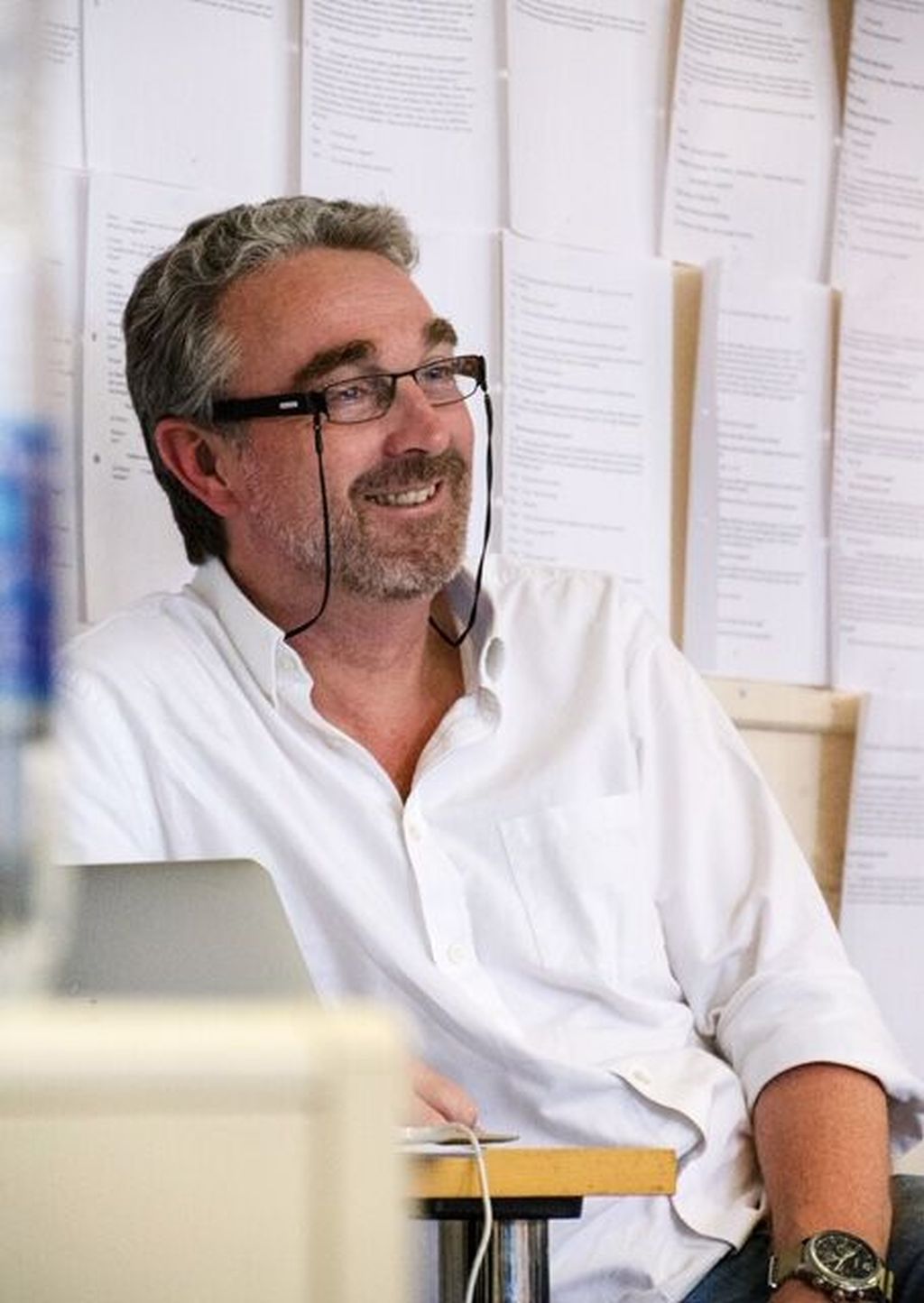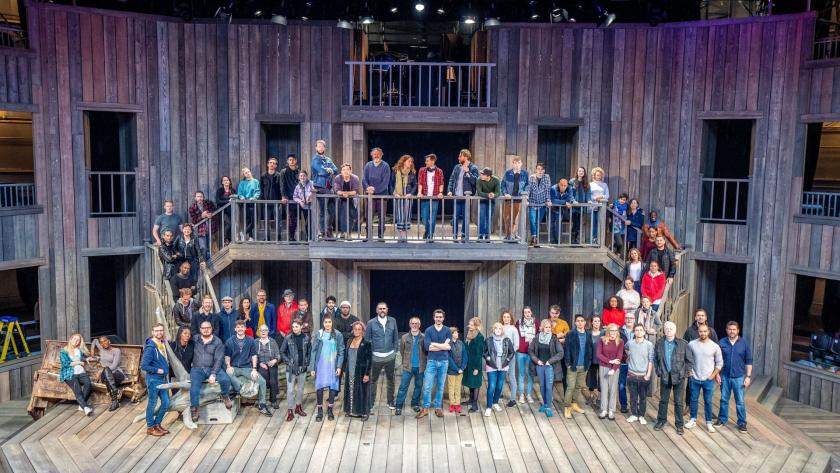How we deliver culture in the modern day is complex. There are many misconceptions about where and who is capable of leading the nation’s cultural charge. The accepted conceit is that if culture doesn’t emanate from certain places, like London or Stratford, then it couldn’t possibly be of value. By way of response, Shakespeare’s Rose Theatre brings affordable, high-quality culture to audiences outside the M25. It promises an immersive experience, accessible to all and undeniably great fun. The artists creating the work have all had a wide range of experience gained in the major arts institutions of the country. It’s made proudly in Yorkshire. It can be of no great surprise that the work is of such a high standard. It surely cannot matter how the work is funded, be it ticket sales or government funding.
Shakespeare’s Rose Theatre is a pop-up 900-seat scaffold facsimile of an Elizabethan Playhouse. The configuration of the space brings the Bard's work to life in a dynamic setting that transports us through time. The work focuses on the physical and, critically, the spoken word in story telling. The actors use no sound enhancement and much time and attention is given to voice production throughout the rehearsal process. The work is contemporary in nature and intention, yet remains in keeping with the Elizabethan performance space.
 Surrounding the theatre is the Village, which has live performance throughout the day, food and drink all presented in a lively environment that gives the visitor the opportunity to relax and immerse themselves in the experience. Last year the project took place in the city centre of York and over 80,000 people came. This year we are in the majestic setting of Blenheim Palace as well as back home in York. It’s not the Globe but it is Shakespeare of the highest quality coming to your doorstep. The long term plan is to take this pop-up theatre around the nation and even further afield. (Damian Cruden, pictured above right)
Surrounding the theatre is the Village, which has live performance throughout the day, food and drink all presented in a lively environment that gives the visitor the opportunity to relax and immerse themselves in the experience. Last year the project took place in the city centre of York and over 80,000 people came. This year we are in the majestic setting of Blenheim Palace as well as back home in York. It’s not the Globe but it is Shakespeare of the highest quality coming to your doorstep. The long term plan is to take this pop-up theatre around the nation and even further afield. (Damian Cruden, pictured above right)
Last year’s project was tremendously rewarding as well as challenging. This year's step up from one venue to two, from four plays to eight, from three directors to seven, and from 34 actors to 76 has been surprisingly uncomplicated. The company is made up of professional artists experienced in working throughout the country: many are ex-Globe, RSC and National performers and theatre makers. We now have four companies of 19 actors, each company performs in two plays, and each venue has two companies. We work across the projects, designers deliver stage design on one play and costumes on another, fight directors, choreographers and vocal coaches likewise. The creative process is shared and as a result resources of time, money and people are also generously exchanged to meet the individual needs of each production.
Our intention has been to create the circumstances in which people can find freedom to express themselves, whilst faithfully telling such great stories loved by many. However familiar these stories may be to some they are also new to others, so the language, characters and narratives must be balanced with ensuring something relevant and fresh for modern-day audiences. The governing aesthetic is to keep the staging lightweight, to let the language do the work and the actor tell the story. From a steam-punk Tempest through to a politically charged Henry V, a witty and human Hamlet, a raucous Twelfth Night and magical Midsummer Night's Dream, to name but a few of our offerings, we certainly have a comprehensive range of work with which our audiences can engage. (Pictured below: an artist's impression of the pop-up Elizabethan facsimile at Blenheim Palace) The opportunity to see actors in contrasting roles gives a good excuse for return trips. You get to see Macduff as Bottom, Ophelia as a comedy policeman, Henry V as Antonia: examples, all, of true ensemble playing. A creative process such as this requires discipline. We have focused on voice and movement work in combination to ensure that clarity and audibility are at the heart of everyone’s process. Eighty or so actors and directors warming up is a sight to behold. It’s like Shakespeare boot camp. The day sees activity taking place throughout the nine rehearsal rooms: fight calls, voice coaching sessions, rehearsals, wardrobe fittings, to name but a few. All this revolves around an office of stage managers creating schedules that accommodate the aforementioned requests, chasing props, arranging accommodation, photo-calls and, of course, a company barbeque!
The opportunity to see actors in contrasting roles gives a good excuse for return trips. You get to see Macduff as Bottom, Ophelia as a comedy policeman, Henry V as Antonia: examples, all, of true ensemble playing. A creative process such as this requires discipline. We have focused on voice and movement work in combination to ensure that clarity and audibility are at the heart of everyone’s process. Eighty or so actors and directors warming up is a sight to behold. It’s like Shakespeare boot camp. The day sees activity taking place throughout the nine rehearsal rooms: fight calls, voice coaching sessions, rehearsals, wardrobe fittings, to name but a few. All this revolves around an office of stage managers creating schedules that accommodate the aforementioned requests, chasing props, arranging accommodation, photo-calls and, of course, a company barbeque!
The wonderful thing is that as I write in the run-up to opening Hamlet, I’m not stressed in any way. The project is working as we had hoped. People are enjoying the process, finding reward in the creative challenges and producing great work. Despite the potential for discomfort in a temporary space, not to mention the complication of creating a team and infrastructure from scratch, we have managed to do it all with good humour and mutual respect.
And all of this has been achieved in a commercial setting. There is no public subsidy, only the bravery of James Cundall and Paul Mansfield, Lunchbox’s lead producers. Their faith in the team to deliver is refreshing in its openness. The work has great integrity, the bottom line is never dumbed down, and the acting company is fully supported by the management. Yes, there is an awareness of the need to sell tickets but this does not require that the work should be simplified. Quite the opposite, there is a genuine desire to see high-quality work on the two stages, complex in its concepts yet accessible to all. Do come join us when and where you can.















Add comment